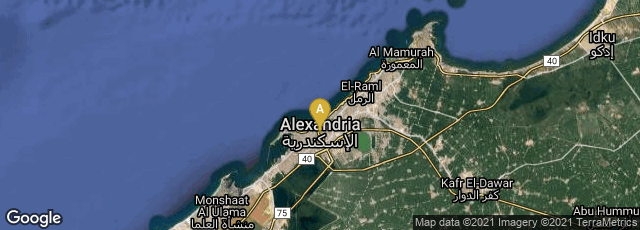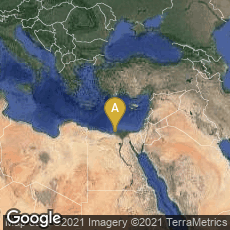

A: Alexandria Governorate, Egypt
"Roger Pearse, an English scholar and blogger on Late Antiquity and Patristics, has published a translation into English of the account of the Muslim historian al-Qifti on the destruction of the Library of Alexandria. The translation was made by a French scholar, Emily Cottrell, and she based it on Julius Lippert’s edition.[1] It seems the first translation into English of the first account of the destruction of the Library of Alexandria.
"Al-Qifti[2] (c. 1172–1248)[3] was an Egyptian Arab scholar and an Ayyubid vizier. He wrote several books but his book Ta’rikh al-hukama’ (History of Learned Men),[4] is what made him famous. It contains 414 biographies of physicians, philosophers and astronomers; including that of Yaḥyā al-Naḥwī. The book was translated into German by the Austrian scholar Julius Lippert (1839 – 1909) but never into English.
"It is in the biography of Yaḥyā al-Naḥwī that ibn al-Qifti tells us the story of the destruction of the Library of Alexandria at the hands of the Arab invaders of Egypt in the seventh century on a direct order by the second successor of Muhammad, Caliph Umar ibn al-Khaṭṭab (634 – 644 AD), to his emir, ‘Amr ibn al-ʿĀṣ. Al-Qifti is the first one who tells us about this."
Both Pearse and Bose quote the full translation of the relevant passages, so I am inclined to requote only the most relevant passages of Cottrell's translation, under the assumption that one or both of these blogs will have reasonable longevity in cyberspace:
"As we have seen in a previous article, it was the 13th century Arab historian of the Ayyubid period, al-Qifti (c. 1172–1248), who first wrote about the destruction of the Library of Alexandria at the hands of the Arabs who invaded Egypt and occupied it in 642 AD. Another writer who wrote about it in the 13th century was Gregory Bar Hebraeus (1226 – 1286), an archbishop of Syriac Orthodox Church in Persia.
"Bar Hebraeus wrote in Syriac and Arabic many books. One of his Arabic books on history is called Mukhtasar fî’l-Duwal, which was published and translated into Latin by the English scholar Edward Pococke (1604 – 1691) under the title Historia Compendiosa Dynastiarum.[1] I have translated the passage describing the destruction of the Library of Alexandria in Bar Hebraeus, Historia Compendiosa Dynastiarum.[2] AS the reader will see, Bar Herbaeus takes from al-Qifti. The translation is as follows:
"And in this time Yahya[3] who is known to us by the name Grammaticus[4], which means al Nahawi (the Grammarian), became famous with the Muslims. He was Alexandrian and used to believe in the faith of the Jacobite[5] Nazarenes[6] , and confess the beliefs of Saweres[7]. He then recanted what the Nazarenes used to believe in the Trinity, and the bishops met up with him in Misr[8] and requested him to return back from what he was at, and he did not return back to their faith, and he lived until Amr ibn al-Ass[9] conquered the city of Alexandria. Amr entered Alexandria and got to know about Yahya’s position in sciences, and Amr was generous to him; and he heard his philosophical sayings which the Arabs were not familiar with, and he became fond of him. And Amr was sensible, a good listener and thinker; so Yahya accompanied Amr and did not depart from him. Then one day Yahya said to Amr, “You have control of everything in Alexandria, and seized all sorts of things in it. Anything which is of use to you I will not object to it, but anything which is not useful to you we deserve it more.” Amr said, “What things you are in need of?” He replied, “The books of wisdom that are in the royal stores.” Amr said to him, “I cannot issue orders about them until the Amir of the Believers, Umar ibn al-Khattab[10], gives his permission.” And Amr wrote to Omar and told him of what Yahya had said. Omar wrote to him saying, “About the books you have mentioned, if there is something in them that goes along with what is in the Book of Allah[11], the Book of Allah suffices; and if in them there is something that contradicts the Book of Allah, then there is no need for them.” And he ordered that they get destroyed; and so Amr ibn al-As started distributing them to the baths of Alexandria to be burned in their furnaces, and so the books heated the baths for a period of six month. Listen to what had happened, and marvel at it!"
In an additional blog post dated October 6, 2017 Dioscorus Boles quoted a somewhat earlier account of the destruction of the Alexandrian Library by the Arab physician, philosopher, historian, Arabic grammarian and traveler Abd Al-Latif al-Baghdadi: Boles wrote:"In two previous articles, which you can access here and here, we have seen the evidence for the destruction of the Library of Alexandria as one finds in the accounts of the Muslim historian al-Qifti and the Christian scholar Bar Herbaeus, both from the 13th century, with the latter copying from the former. Both tell us very clearly that the Library of Alexandria was destroyed by the Arabs on direct instruction by the Second Muslim Caliph, Umar ibn al-Khattab (634 – 644 AD). This makes the year of its destruction lies sometime between the years 642-644, since the fall of Alexandria in the Arab hands occurred in 642 AD.
"We are told that the Arab emir, ‘Amr ibn al-‘Āṣ, consulted ibn al-Khattab on what to do with the books in the Library of Alexandria. Ibn al-Khattab’s answer came quick to him:
“As for the books you mention, if there is in it what complies with the Book of God [Q’uran], then it is already there and is not needed and if what is in these books contradict the Book of God there is no need for it. And you can then proceed in destroying them.”[1]
‘Amr ibn al-‘Āṣ then ordered that the books should be dispersed in the public baths and to burn them in the bath’s heaters. Al-Qifti adds: “And I was told that at that time several public baths used [the books] for heating, bringing some fame to new public baths which later on were forgotten afterwards and it is said that they had enough heating for six months. One who listens to what has happened can only be amazed!”[2]"
"Another Arab writer who confirms the story that the Library of Alexandria was burnt on the orders of the Muslim Caliph, Umar ibn al-Khattab, is Abd al-Latif al-Baghdadi (1162–1231).[3] He was born in Baghdad in the Abbasid Caliphate and travelled to Egypt and wrote a book on his findings and observations of it called in Arabic “كتاب الإفادة والاعتبار في الأمور المشاهدة والحوادث المعاينة بأرض مصر”,[4] which he finished writing in 600 AH (1203/1204 AD). On our story, he writes:[5]
[Here Boles publishes the Arabic text.]
"The translation of the above Arabic text is as follows:
"And I also saw around ‘amoud al-sawari [Pompey’s Pillar] some of the columns that were intact and some that were broken; and it looks they were [once] roofed, and that ‘amoud al-sawari had a dome which was supported by it. And I think that it was the hallway in which Aristotle and his followers after him taught; and that it was the house of sciences which Alexander [the Great] had built, and in which was the library that was burnt by Amr ibn al‘Āṣ on permission by Umar ibn al-Khattab.
"Here we have perhaps the earliest mention of the destruction of the Library of Alexandria, which the writer calls “خزانة الكتب”, by the Arabs who invaded Egypt and captured Alexandria in 642 AD after having consulted Umar ibn al-Khattab, Muhammad’s second successor."
In a different blog post on October 6, 2017 Boles cited a reference in the work of the 14th century Egyptian Arab historian Al-Maqrizi regarding the destruction of the Alexandrian library:
"In three previous articles (here, here and here) we have seen the accounts of three writers (al-Qifti, Bar Hebraeus and al-Baghdadi) on the destruction of the Library of Alexandria by the Arabs on direct commandment by the Muslim Caliph Umar ibn al-Khattab (643 – 644 AD). Now, we shall look at the account of the Egyptian historian al-Maqrizi.
"Al-Maqrizi (1364–1442)[1] lived during the Burji Mamuluks who ruled Egypt from 1371 to 1517. Al-Maqrizi was a prolific writer but his fame is due mainly to his voluminous book al mawaiz wa al-‘i’tibar bi dhikr al-khitat wa al-‘athar otherwise known as al-Khitat al-maqrizia.
"In al-Khitat al-maqrizia, Maqrizi talks in a long section about what the Arabs call ‘amoud al-sawari (عمود السواري) by which they mean ‘Pompey’s Pillar’. One passage of the section reads:

"And here is its translation:
“It is to be mentioned that this pillar was one of pillars that used to support the hallway of Aristotle who used to teach wisdom in it. It was a house of learning, and khizanat al-kotob (خزانة الكتب)[the Library of Alexandria], which ‘Amr ibn al-‘As burned on the commandment of Umar ibn al-Khattab, May Allah be pleased with him, was in it.”[2]".